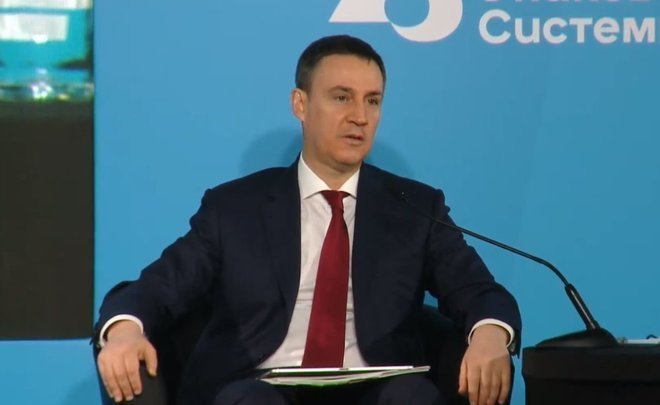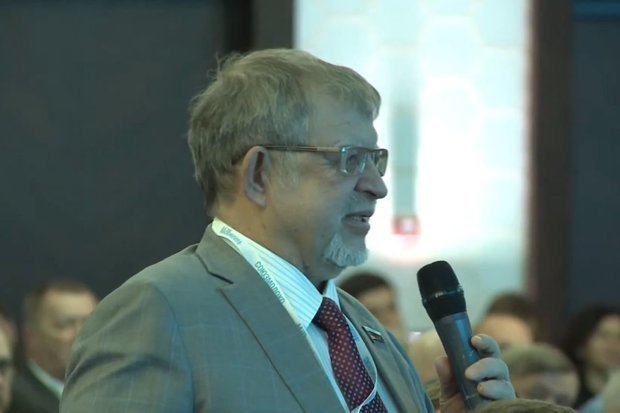‘At some point, Ministry of Agriculture did not have the resources to continue concessional lending’
Dmitry Patrushev explained why soft loans are linked to the Central Bank rate

“The final rate on preferential loans in the agro-industrial complex will directly depend on the key rate of the Central Bank — dairy farmers so far will receive preferential loans at 6.8% per annum (instead of the previous 5% per annum)," Agriculture Minister Dmitry Patrushev explained the difficulties of the moment at the congress of the National Union of Milk Producers. At 6.8% per annum, perhaps, not the most “frightening” loans that the Ministry of Agriculture managed to lobby for. But this year, 100% subsidisation of transportation costs for exporters of domestic “milk” will disappear. The head of the Ministry of Agriculture fears that maximum dairy products will be exported from the country, which will inevitably lead to an increase in prices on the domestic market.
All-Russian dairy “briefing”
The ambiguous results of the dairy industry in 2023, which experienced an acute shock due to a sharp drop in purchase prices last spring, were summed up at the next congress of the National Union of Milk Producers in Moscow on 23 January. It was held at the prestigious MonArch Moscow Hotel and brought together the leading milk producers and processors in the country. Suffice it to say that a large delegation from Tatarstan took part in its work, and the chair of honoured guests in the first row was occupied by Minister of Agriculture and Food of the Republic of Tatarstan Marat Zyabbarov.
A large number of guests from different regions arrived not only to listen to the report speech of Minister of Agriculture of Russia Dmitry Patrushev, announced in the forum's programme. They were worried: what's next? How is the government going to subsidise agriculture in the future if most subsidies and grants were curtailed the day before? At least, Tatarstan farmers found themselves in some confusion after the suspension of preferential support programmes. Meanwhile, Tatarstan is among the top three regions that received the most funds for subsidising short loans in dairy farming. Fpr example, by the end of 2022, the republic took 145.6 billion rubles of loans, which were subsidised by 16% from the federal budget.
Milk rivers from Belarus
Despite all kinds of cataclysms, 33.5 million tonnes of milk were produced in the country, which is by almost 0.5 million tonnes more than a year earlier, the head of the Ministry of Agriculture said. “We produced 33.5 million tonnes of milk, which is a very good result, it is by almost half a million tonnes more than a year earlier," Dmitry Patrushev said. This had a beneficial effect on the rate of milk processing: the production of cream increased by 21%, hard cheeses — by 16%, ice cream — by 12%, and dry milk mixtures — by only 8%.
At the same time, the domestic demand for dairy products was closed by 90%, it followed from Dmitry Patrushev's report. Belarus has become a major importer of milk powder. According to the minister, only 5.5 million tonnes were supplied to the country. And in particular, drinking milk, cheeses, and cream — just in those positions where there is an increase in own production. The financial results of the industry were not announced, but, as Artem Belov, CEO of the union, modestly noted later, “by the end of the year, the profitability of enterprises in the agro-industrial complex had stabilised.”
“I understand that it hurts both you and us”: preferential loans are linked to the Central Bank rate
The most painful question for the industry is whether preferential loans at 5% per annum will remain under the new conditions? Arkady Ponomarev, a deputy of the State Duma, agrarian from Voronezh Oblast, decided to raise it. “It is problematic to implement challenges for agriculture without state support. Will concessional lending continue at 5% per annum?" he asked the minister of agriculture the first question. And then the second one: is it possible to increase the limit of such a loan for one borrower (now it is 600 million rubles).

The head of the Ministry of Agriculture of Russia announced that the mechanism of preferential lending to agriculture will be changed this year. The interest rate on concessional loans will depend on the Central Bank's key rate and will change in accordance with its value. “The final rate on preferential loans in the agro-industrial complex will directly depend on the Central Bank's key rate — while dairy farmers will receive preferential loans at 6.8% per annum," he replied. For other sub-sectors of agriculture, the rate will be higher. He added that otherwise it would not be possible to rhythmically issue loans. The minister recalled that concessional lending was resumed last autumn, as the Ministry of Agriculture had no resources before that.
“I understand that it hurts both you and us," the head of the department sighed. And he promised that in the event of a reduction in the Central Bank's key rate, the final rate for borrowers would be decreased. “Now it will be a living mechanism that gives the opportunity to review contracts," he warned.
Dmitry Patrushev answered the second question succinctly: “For now we will stay in this amount.” And he explained that it was not worth demanding more. “We live under budget constraints. If we were given more money, then... colleagues, we are all waiting for the Central Bank's rate cut. As soon as it happens, it will immediately affect the final cost of the loan," he said. In total, over 61 billion rubles were allocated to support the dairy industry last year, Patrushev said.
If prices accelerate, the Ministry of Agriculture of Russia will take unpopular measures
Starting this year, subsidies for dairy exporters will be cancelled. To expand foreign supplies, the Ministry of Agriculture of the Russian Federation introduced 100% compensation for transportation costs last year, which was used by many enterprises with workshops for the production of powdered milk. One of them was Meleuzovsky Dairy Cannery PLC from Bashkortostan. The company has started supplies to China, Africa, and Algeria in particular. And the manufacturer itself passed export certification and is included in the register of exporters in Cerberus FGIS and the Chinese registration system CIFER. The owner of the plant, Andrey Yarovoy, asked if the support of exporters would continue, but received a negative answer.

Dmitry Patrushev explained that exports supplies were then necessary to regulate the oversupply of milk in the domestic market, and the measure itself helped to raise the purchase prices for milk. As a result, the external supply of milk powder increased 6 times compared to 2022, and the supply of whey doubled, Patrushev noted, and this made it possible to remove certain surpluses from the domestic market and thereby adjust the cost of products.
And now the priority is to maintain stable prices for dairy products within the country. And he warned that if prices accelerate, the Ministry of Agriculture of the Russian Federation will take unpopular measures. “Of course, we are guided by the need to maintain stability in the domestic market without any sharp fluctuations, therefore, dear colleagues, everyone should understand that if necessary, if our prices accelerate, we have all the necessary regulatory levers to prevent this process, so look too, please do not let the prices rise sharply. Otherwise, it will lead to that we will be forced to make unpopular decisions to stop this process," the minister said. From the beginning of the year to January 15, drinking pasteurised milk rose in price by 0.57%, sterilised milk — by 0.55%. In general, in 2023, milk and dairy products in Russia rose in price by 0.5%.